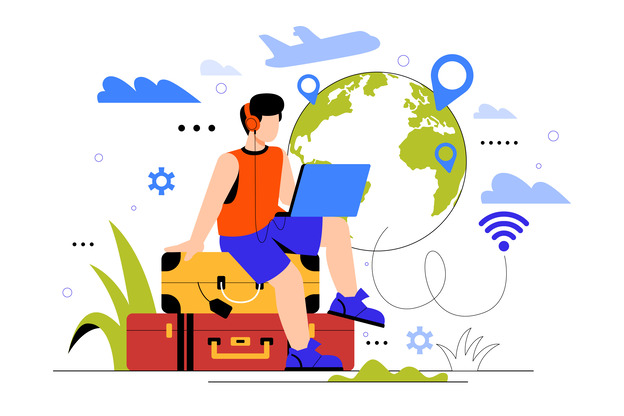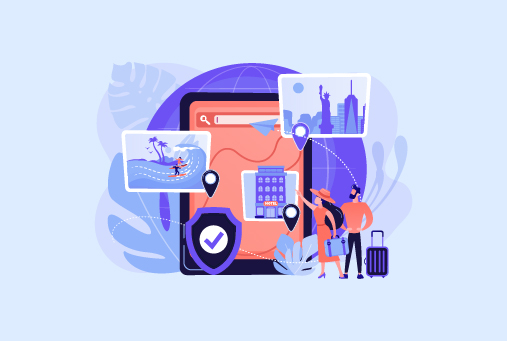
Using VPN while traveling
Traveling is something we people do more and more. But here’s the thing about modern travel, we’re more vulnerable when we’re on the road. Think about it. You’re tired, distracted and connecting to networks you know absolutely nothing about. Meanwhile hackers specifically target travelers because they know we’re easy targets.
Public WiFi is Scarier Than You Think
Hotel WiFi is basically a free for all. Most places use the same password for months, sometimes years. Everyone from the guy in room 302 to that sketchy character in the lobby has access to the same network.
I stayed at a hotel in Rome where the WiFi password was literally “password123.” Anyone could join, and once you’re on the network, you can potentially see what other people are doing online.
Airports are even worse. Those “Free Airport WiFi” networks? Half of them are fake setups created by criminals. They’re hoping you’ll connect to just their network so they can access your data.
Restaurants aren’t much safer. The password is usually written on a board for everyone in the restaurant to see. That cute cafe in Paris might have great croissants but their WiFi security is probably terrible.
A friend of mine got his credit card details stolen while checking email at an airport in Mexico. The hacker was sitting three tables away, using the same WiFi network. My friend had no idea until fraudulent charges started showing up days later.
Why I Never Travel Without a VPN Anymore
A VPN is like having a bodyguard for your internet connection. Everything you do online gets scrambled before it leaves your device. Even if someone intercepts your data it just looks like gibberish to them.
This saved me during a business trip to Singapore. I needed to access sensitive work files from my hotel room. Without a VPN anyone on that network could have potentially seen confidential company information.
But VPNs aren’t just about security, they’re also about convenience. Ever tried watching Netflix in a foreign country? Half your shows just disappear because of licensing restrictions. With a VPN I can connect to a server back home and watch whatever I want.
Here’s a money saving trick I discovered by accident. Flight prices can vary wildly depending on where you’re browsing from. I was booking a flight to Tokyo and noticed the price was $200 cheaper when I connected through a VPN server in a different country. Now I always shop around using different locations.
Picking a VPN That Actually Works for Travel
Not all VPNs are created equal. I’ve tried probably a dozen different services over the years, and some are just terrible for travelers.
You need servers in your home country so you can access familiar services. But you also want servers near where you’re traveling for better speeds. There’s nothing worse than a VPN that makes your internet crawl.
The mobile app has to be dead simple. When you’re exhausted at 2 AM trying to connect to airport WiFi, you don’t want to mess around with complicated settings. One tap connection is what you’re looking for.
Speed matters way more when you’re traveling. You might be video calling family back home or trying to upload photos to social media. A slow VPN will make these basic tasks incredibly frustrating.
Battery life is crucial too. VPNs drain your phone faster, and you can’t always find a charging port when you need one. Some apps are much more efficient than others.
Booking Travel Online
When you book trips online you are sharing tons of personal information, for example Credit card numbers, passport details and home addresses. All of this flows through the internet and you want to make sure its all protected.
I always use my VPN when booking flights or hotels now days. It adds an extra layer of protection during these transactions. As I mentioned earlier you might even find better prices by appearing to browse from different locations.
Watch out for booking sites that seem too good to be true. Scammers create fake travel websites specifically to steal payment information. Always double check you’re in fact on the real site before entering any details.
The travel industry has gotten much smarter about security lately. Airlines and hotels now use really sophisticated systems to verify who you are without making the process painful.
Most companies use advanced verification services like Checkin.com to confirm identities super quickly. Instead of standing in long lines with paper documents you can often verify everything using your phone in seconds.
I experienced this firsthand when checking into a hotel in Amsterdam. Instead of the usual paperwork shuffle I just scanned my ID with their app and was done in under a minute. The system verified my identity instantly and even had my room preferences ready.
Airlines are doing similar things with mobile check in. The verification happens behind the scenes using biometric data and document scanning. It’s faster for passengers and more secure for the airline. This technology is especially helpful for international travel where different countries have different requirements. The systems can handle all these variations automatically so you don’t have to worry about the details.
Different Countries, Different Rules
VPN laws are all over the place depending on where you go, most places don’t care at all. I’ve used VPNs throughout Europe, North America and most of Asia without any issues.
Some countries are however stricter. China blocks most commercial VPN services, though enforcement can be inconsistent. Russia has tight regulations too and UAE restricts VPN use for certain activities.
I always research the local laws before traveling somewhere new. The last thing you want is to accidentally break regulations in a foreign country. When in doubt, check with your embassy.
Business travelers often have extra considerations. Your company might require specific VPN protocols or have policies about accessing corporate networks from abroad.
Even in VPN friendly countries the local internet can affect how well your VPN works. Rural areas might have slower connections. Some regions just don’t have many nearby servers to choose from.
Getting Your VPN Ready for Travel
Set everything up before you leave home. Download the apps, test the connections and make sure you know how everything works. Trust me, you don’t want to be troubleshooting VPN issues when you’re already dealing with jet lag.
I always download offline maps and important apps before traveling. This gives me backup options if the VPN fails or internet access is spotty.
Most good VPN apps can automatically connect when they detect unsecured networks. This is a lifesaver because you’ll often forget to manually connect when you’re tired or distracted.
Bring portable chargers. VPNs use extra battery and finding charging ports at airports or cafes isn’t always easy. Some apps have power saving modes that help extend battery life.
Learn how to switch servers quickly. If one server is slow or gets blocked, you want to be able to try others without hassle. Most apps make this pretty straightforward.
When Things Go Wrong
VPN connections fail sometimes, especially when you’re moving between different networks. Most apps will automatically reconnect but you might need to do it manually occasionally.
Some websites actively try to block VPN traffic. If you can’t access something important, try different servers or temporarily disconnect for that specific task.
Hotel networks can be tricky. Some have restrictions that interfere with VPNs. If you’re having trouble connecting you can try a different setting or ask the front desk for help. Many hotels can adjust their network to allow VPN traffic.
Speed problems are common when traveling. Try connecting to servers closer to where you actually are for better performance. Avoid servers in countries known for poor internet infrastructure.
Connection drops can temporarily expose your real location. Look for VPN apps with kill switches that automatically block internet access if the VPN disconnects.
Making Travel Better and Safer
A VPN is just one piece of good travel security. You still need strong passwords, two factor authentication and updated software. Don’t put all your trust in just the VPN.
- Be aware of your surroundings when using devices in public. People can look over your shoulder and see what you’re doing. Screen privacy filters can help with this.
- Check your bank accounts regularly after traveling. Look for anything suspicious and change passwords if something seems a bit off.
- The whole point is to be able to travel with confidence. Good internet security habits, including VPN use, lets you focus on enjoying your trip instead of worrying about digital threats. Being able to travel is incredible. We can explore the world while staying connected to home. With the right precautions you get the best of both worlds. Stay safe out there and enjoy the adventure.


